Lee's clever obsequience, Trump's utter stupidity set tone for US-ROK Summit
The newly elected President of South Korea managed to win over the martial law President with flattery, smiles, and an unexpected celebration of his country's raucous and hard-won democracy
OCCUPIED WASHINGTON - Lee Jae Myung, the President of the Republic of Korea, was running late for his 6 p.m. speech on Monday to the Center for Strategic and International Studies, Washington’s most powerful military think tank.
Lee had just left the White House after spending a long afternoon with Donald J. Trump and his America-First foreign policy team of MAGA extremists and kooks. He looked tired.
Two hours before the meeting, Lee explained through his interpreter, the predictable POTUS had issued a “threatening post” that involved a South Korean investigation into several unnamed churches and a “search and seizure” at a US military base in his country. “Seems like a Purge or Revolution,” Trump declared.
“I was afraid we faced a Zelensky moment,” Lee (pronounced “ee”) joked to the CSIS assembly of the men and women who oversee U.S. policy in Japan and Korea.
In fact, according to Seoul’s state-owned wire service, Trump’s post had freaked out Lee’s national security advisers just before he was to sit down with Trump, the smug JD Vance, and the stoic Marco Rubio - the same men who had jumped down Zelensky’s throat last March. As the Yonhap dispatch went out, Trump confirmed his post, telling the White House press corps that he had heard about “very vicious raids on churches by the new government in South Korea.” They “even went into our military base and got information,” he charged, adding that he “won't stand for that.”
At CSIS, Lee said he’d prepared for that moment by reading Trump’s The Art of the Deal, where he learned that the president’s technique is to “present conditions that are hard to accept” but at the end come to a “not bad solution.” So “I was confident he would not inflict a wound on our alliance,” he assured his audience. His gambit seems to have worked.
The Truth Behind Trump’s Rumor-Mongering
Over the summer, Korean investigators began looking into corruption involving the impeached former president Yoon Suk-Yeol. They focused on the Unification Church for apparently bribing members of Yoon’s family, including his wife, Kim Keon Hee (she was arrested on August 12th, giving the Yoons the dubious distinction of becoming the first presidential couple in Korean history to be jailed).
These “vicious” probes into the Moonies are of interest to Trump because he has been paid millions of dollars over the year to speak to the fascistic religious cult. (For context, it’s also important to remember that during the era of US-backed military governments in South Korea, martial law authorities made hundreds of raids on Korean churches, Protestant and Catholic. During the 1970s and 1980s, many clergy involved in the democracy movement were hunted down and imprisoned, and some were executed.)
Since July, meanwhile, Korean prosecutors have been investigating allegations that Yoon, as president, ordered his military commanders to provoke North Korea by sending drones over Pyongyang to justify his martial law declaration on December 3, 2024. In response, the government sent investigators to Osan Air Base, a major US Air Force base operated jointly with the South Korean military, to seek evidence “related to an unmanned infiltration operation allegedly carried out by South Korea’s Drone Operations Command in late 2024.” This action was blown out of proportion by the Chosun Daily and other right wing Korean media and apparently passed on to Trump.
At the White House, Lee finessed Trump’s concerns by giving him the blunt truth. “It hasn’t been long since Korea overcame the political turmoil following the self-coup by the former president,” he explained to the twice-impeached Trump. “Currently, there’s a fact-finding investigation by a special prosecutor that was appointed by the National Assembly. That special prosecutor is not under my control.” On the military investigation, Lee explained that prosecutors “did not conduct a search and seizure of American bases, but they looked into the control system of the Korean military.”
Trump seemed to buy this explanation. “That’s OK. I’m sure it’s a misunderstanding, but you know there’s a rumor going around about raiding churches, so we’ll talk about it,” he replied. That “rumor” no doubt came from MAGA sleuths like Laura Loomer, an unofficial Trump adviser who has labelled President Lee a “communist,” and Gordon M. Chang, who spews lies fed to him by the Korean far right on Twitter/X and in interviews with Trump’s favorite Fox reporter, Maria Bartiromo.
But Lee didn’t fall for their propaganda or make any apologies. Instead, he turned to flattery, as the AP’s Seung Min Kim captured in her report.
Any prospect of a hostile Oval Office meeting evaporated after Lee heaped praise onto the U.S. president — lauding the decor, beseeching Trump to continue to help with Korean peace efforts and even suggesting a Trump Tower in North Korea. “I heard that you recently redecorated the Oval Office, and I would like to say that it looks very bright and beautiful,” Lee said.“It has the dignity of America, and it symbolizes the new future and prosperity of America.”
[Lee] noted that the Dow Jones index has reached record highs (although Lee made sure to add the caveat that “it went down a bit”) and asked Trump, who has been on a mission to receive the Nobel Peace Prize, to reunify the two Koreas and even perhaps see the construction of a Trump Tower in North Korea accompanied by a round of golf. Lee also agreed with Trump’s assertion that North Korean leader Kim Jong Un would not have continued to enhance his nuclear capabilities the last few years had Trump remained in office.
Noting a “renaissance” that is taking place, Lee said, “I believe you are the only leader who has made such accomplishments.”
Trump loved it. “We’ve known each other and gotten along very well,” he told Lee. “It’s a great honor to be with you and congratulations on your election. That was a big one, and we’re with you 100 percent.” He added that he has “a great relationship” with Kim Jong Un and that President Lee is "more prone" to resolving issues with the DPRK "than any other leader" Trump had worked with.
Yet both Trump and Lee seemed to be talking fantasy about the DPRK. Over the last year, the country has made it very clear it won't talk to Trump until the United States ends its 73 years of hostility towards North Korea. It also believes that South Korea, with its military alliances and partnerships with Washington and Tokyo, is simply a tool of the Americans and the LDP government in Japan. Still, Kim himself has refrained from criticizing the two powers, and has largely left that job to his sister, Kim Yo Jong.
"We clarify once again the official stand that no matter what policy is adopted and whatever proposal is made in Seoul, we have no interest in it and there is neither a reason to meet nor an issue to be discussed with" South Korea, Ms. Kim said in July about President Lee’s outreach to the North (AP, in its headline, called that outreach “appeasment,” displaying the US media’s incredible bias against direct talks with the DPRK).
A few weeks later, Kim Yo Jong said she doesn’t deny that the personal relationship between Kim Jong Un and Trump “is not bad.” But she said if their personal relations are to serve the purpose of North Korea’s denuclearization, North Korea would view it as “nothing but a mockery.” She admitted that North Korea’s nuclear capability has sharply increased since the first round of the Kim-Trump diplomacy and that any attempt to deny North Korea as a nuclear weapons state would be rejected, AP reported.
“If the U.S. fails to accept the changed reality and persists in the failed past, the DPRK- U.S. meeting will remain as a ‘hope’ of the U.S. side,” she added.
Trump’s Diatribe of Lies
In his meeting with Lee, Trump launched into an incredible diatribe of lies that the Korean president responded to politely. The first concerned his 2018 talks with Kim Jong Un, which Trump said had “saved” the South Korean Winter Olympics by persuading foreign visitors who feared visiting the tense peninsula to buy tickets.
In fact, those talks - which I covered extensively for The Nation - started months after ROK President Moon Jae In met with Kim Jong Un at the DMZ and subsequently informed Trump that the DPRK leader wanted to meet. Trump’s statements about nobody buying Olympic tickets until then was a fabrication. As I wrote at the time, Trump’s vice president, Mike Pence, shunned Kim Yo Jong when she sat close to him at the Olympic Stadium and only came to the Games to counter North Korea’s unprecedented diplomatic presence.
Trump spouted more lies about the “comfort women,” the girls and women forced into sex slavery by the Japanese military during World War II that has been a major barrier to relations between South Korea and Japan. The comfort women are a "big problem for Korea, not for Japan," Trump declared, adding that Tokyo wanted to get on." To make his point, Trump said that Shinzo Abe, Japan’s former Prime Minister asssinated in 2022, was a “great man” who felt “very warmly” about Korea.
In fact, Japanese politicians from Abe’s ruling Liberal Democratic Party have frequently denied that “comfort women” were exploited during World War II, earning the enmity of Koreans on both sides of the DMZ. And Abe, who was also a great pal of Hillary Clinton’s, was Japan's most radical denialist of its imperial wartime crimes, including its kidnapping and exploitation of sex slaves in military “comfort stations.”
Lee knows that. But in his meeting with Japanese Prime Minister Ishiba just before flying to Washington, he pledged to honor the bilateral agreements on “comfort women” made by Yoon and other conservatives with Abe and the LDP. His acceptance of those one-sided agreements, in which Japan offered no apologies, deeply angered many of his voters in South Korea. Last week in Seoul, 693 civic groups held a press conference calling on Lee “to hold Japan accountable for its historical wrongdoings during his summit” with Ishiba. His failure to do so has “left a bitter taste” in South Korea, the progressive Hankyoreh editorialized as Lee flew to DC.
On the security front, Lee made it clear he is in sync with the US government and the military establishment in Washington despite his pledge to retain relations with China, the Washington Post favorably reported.
Lee is instead leaning into South Korea’s security alliance with Washington and emphasizing that South Korea wants to cooperate with the United States. The approach also reflects shifting public opinion in South Korea; the public has become more critical of China in recent years because of coercive behavior from Beijing and cultural disputes, public surveys show.
There are a number of thorny unresolved issues between the two allies — including the potential removal of U.S. troops from South Korea, Seoul’s share of defense spending to host U.S. troops in the country and the tariff negotiations. Washington also seeks to use U.S. troops deployed to South Korea for China-related contingencies and wants Seoul to take greater responsibility in deterring North Korea.
Trump declined to say whether he would reduce the number of U.S. military personnel stationed in South Korea. “We’ve been friends, and we’re friends,” he said, when asked by a reporter about a potential reduction, saying, incorrectly, that the U.S. has over 40,000 troops in South Korea. The actual number is about 28,500.
Still, Lee managed to establish a certain independence for South Korea in its alliance with the United States and their dealings with the DPRK. That’s something many Koreans desire as they watch Pentagon officials promote a strategy of “strategic flexibility” of the U.S. forces stationed in Korea “as an excuse to use South Korea as a forward base against China and draw in South Korean troops in the event of a crisis in Taiwan,” as one progressive newspaper put it. As Lee explained to CSIS:
First of all, we will increase our defense budget, which will be used to transform the Korean military into a smart military that will prevail in future warfare. And so we will use it to acquire cutting-edge technology and military assets. At the summit meeting, President Trump stated his willingness to actively support Korea’s efforts to strengthen its military capabilities and further expand bilateral cooperation in the advanced defense industry. Our two countries’ capabilities and posture will be further expanded and strengthened to thoroughly respond to a constantly-changing security landscape and rising threats.
While the ROK-U.S. alliance has made remarkable progress, there remains on the Korean Peninsula an unresolved legacy of the past century, which is the North Korean nuclear issue. Maintaining the goal of a denuclearized Korean Peninsula is extremely important to bring permanent peace to the Korean Peninsula and the world.
President Trump and I have agreed to work closely together to establish peace and achieve denuclearization on the Korean Peninsula. Obligations under the Non-Proliferation Treaty must be strictly observed on the Korean Peninsula, and it is evident that that is in the interests of both Koreas. The Republic of Korea will comply with the NPT regime and strictly keep its commitment to denuclearization.
That’s still a military-first approach. Yet, unlike past presidents, Lee may have given his people a signal that South Korea will not be sidelined in future negotiations with North Korea, which now considers the ROK a separate country with no chance of reunifying with the DPRK.
A “manufacturing renaissance” for the USA?
On the economic front, President Lee was accompanied to Washington by the heads of the largest conglomerates (chaebol) in South Korea. On Monday, he addressed a a day-long Korea-U.S. Business Roundtable with the aim of investing billions of dollars to create a “Manufacturing Renaissance Partnership” with the United States, as the MAGA president has demanded.
The meeting was organized by the Federation of Korean Industries and covered by the JoongAng Daily, a newspaper closely associated with Samsung, Korea’s electronics giant.
Explaining the initiative, FKI Chairman Ryu Jin said, “If Korea and the United States work together in advanced industries such as artificial intelligence, semiconductors and biotech, as well as strategic sectors like shipbuilding and nuclear power — extending to supply chains and talent development — we can usher in a new golden age of manufacturing.”
Korean Air unveiled its largest-ever single investment of $49.9 billion, which includes the purchase of 103 aircraft from Boeing and 19 spare engines from GE Aerospace. The move comes ahead of its planned merger with Asiana Airlines. Hyundai Motor Group added $5 billion to its previously announced four-year, $21 billion investment plan. The additional spending will go toward establishing a new U.S. robotics plant with a capacity of 30,000 units, building on the group’s ownership of Boston Dynamics.
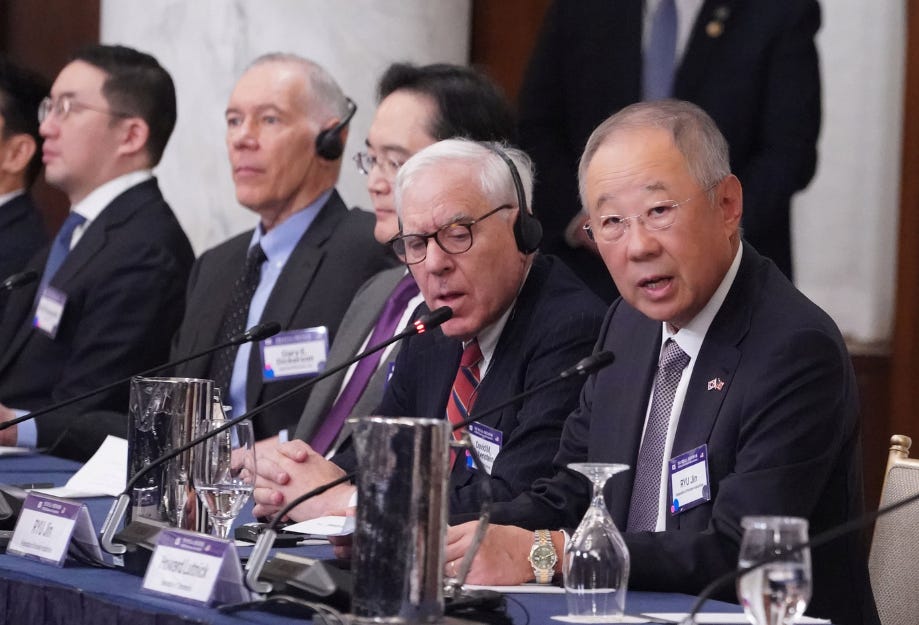
On Tuesday, as part of this initiative, Lee flew to Philadelphia to tour the Hanwha Philly Shipyard and “highlight shipbuilding industry cooperation between South Korea and the United States,” a key priority for the Trump administration. Hanwha Ocean, part of South Korea’s largest military conglomerate, acquired the yard for $100 million last year in what Yonhap said was “a show of Korea's backing for Washington's efforts to shore up the American shipbuilding sector.”
South Korea has more democracy than the USA
For this reporter, who has covered Korea for over 45 years and lives in a city that is, for all intents and purposes, under martial law, Lee’s obsequious flattery of Trump was a bit much. Initially, my reaction to his White House meeting and his praise for Trump at this time was negative: “Disgusting performance by President Lee,” I posted on X after watching the meeting on Fox. “I'm ashamed for the Korean people.” I also noted this post from a Korean who says he is a follower of Kim Dae Jung and Roh Moo Hyun, South Korea’s first two progressive presidents.
Not having an agreement to sign is never good; issues about “strategic flexibility” and China will have to wait, apparently. But as I listened to Lee speak at CSIS and read coverage from the Korean press and analysts on social media, I began to appreciate that the Korean president had lived up to his reputation as the ultimate pragmatist. Plus he had managed to take the air out of Trump's threatening posts and comments by celebrating his country's hard-won democracy and defending South Korea’s sovereignty.
“Korea breathes sigh of relief after Lee’s cordial summit with Trump,” was the headline on Tuesday in the Hankyoreh. “Many had feared a worst-case scenario in which Trump put the screws to Korea on a number of issues.”
[Instead], the two presidents wrapped up a congenial meeting in which they focused on Korean Peninsula issues, including a potential push to arrange a meeting with North Korean leader Kim Jong-un during the Asia-Pacific Economic Cooperation summit, which will be held in Gyeongju in October. “The summit lasted longer than originally expected, serving as a time for the two leaders to build mutual rapport and trust,” said Kang Yu-jung, a spokesperson for Lee’s presidential office.
In response to his rightist critics in the United States and South Korea, Lee also defended his determination to maintain good relations with China. This happened in an interview with reporters on his presidential plane as reported by Chosun Daily.
Asked about perceptions in some American circles that he is “pro-China,” Lee dismissed the notion. “There’s no such thing as pro-China or anti-China in diplomacy,” he said. “If closer ties serve our national interest, we pursue them. If not, we keep our distance. The foundation of our diplomacy is, of course, the South Korea-U.S. alliance. But that doesn’t mean we should sever ties with China. If not severing relations is considered pro-China, then in that sense, we should be pro-China.” He added with irony: “Soon they might say pro-China, pro-North, pro-Russia — maybe even pro-communist. I try not to dwell on those labels.”
Lee’s reception in Washington - and that last comment in particular - was a slapdown of the Korean right, which loathes Lee for leading the opposition to Yoon after his botched declaration of martial law. As “Aqua,” a Korean blogger on X noted with this cartoon, supporters of the disgraced Yoon “were filled with hope right up until President Lee’s departure to meet Donald Trump in the U.S. They had actually expected Trump to arrest Lee at the airport.” Instead, Trump praised Lee to the skies.
The same could be said for the pathetic (and pathological) Gordon Chang, who gets 100 percent of his information from South Korea’s fascist right. On Monday, before the White House meeting, Chang had asked Trump to “please tell Lee Jae-myung that he must end his attack on Korea’s democracy,” referring to the church and US base “raids” Trump had posted about. But on Tuesday, he was pouting that Lee had “misled” Trump and basically complaining that Lee had won his election.
Under South Korean law, Lee picks the prosecutors. And, of course, he controls the National Assembly with his control of the ruling Democratic Party of Korea.
Evil! Yet the same is true in Washington. Chang has no understanding of what makes democracy work, either in South Korea or the United States.
Passing the CSIS Ideological Test
Chang and his fellow rightists are small potatoes compared to the military industrial interests represented by CSIS. Lee’s ability to win over that audience on Monday evening showed that he has the skills to stand up for Korean interests even as he supports South Korea’s military alliance with the United States.
To Korea watchers, CSIS is best known for the presence of Victor Cha, a former security adviser to George W. Bush who personifies the think tank’s role as the guardian of the US military role in South Korea. Funded heavily by the US and Japanese governments as well as major defense contractors such as Lockheed Martin, the organization has played a key role in shaping US policy towards Korea for decades.
In many ways, CSIS is a private intelligence service for the governmen: check out Cha’s latest expose of a “Secret North Korea Missile Base: Sinpung-dong,” brought to you by the CSIS “Korea Chair,” the Brzezinski Institute on Geostrategy, The Korea Foundation, and the UniKorea Foundation. CSIS also keeps close tabs on South Korean politics, particularly when a left-of-center politician like Lee is in power.
Seven years ago, then-President Moon Jae in, widely considered “anti-American” by Washington pundits, was invited by CSIS to speak during his first visit to Washington. He was received somewhat coldly because of his active outreach to the DPRK, and after his speech was forced to endure a two-hour, closed-door meeting with the think tank’s senior leaders, including Richard Armitage and Madelaine Albright.
Lee managed to avoid a similar session. But after his talk, he was interviewed - interrogated might be a better word - by John Hamre, the CEO of CSIS and a former deputy secretary of defense.
Back in 2016, as I reported for the Korean investigative site Newstapa, Hamre sounded the alarm about the danger of another progressive coming to power in South Korea after the conservative president Park Guen Hye fell from grace. In a speech to the Heritage Foundation, Hamre expressed deep concern over the rising strength of South Korea’s left-leaning political parties. “We have to do something so we don’t become an issue in [Korea’s] next election,” he said. “There’s a strong strain in the left parties that America is the problem.”
Eight months later, CSIS and the US foreign policy establishment were forced to accept President Moon, a new, independent South Korean leader with an agenda markedly different than his conservative predecessors. On Monday, CSIS was dealing in a similar way with Lee, who tried to succeed Moon in 2022 but was defeated (narrowly) by Yoon, only to defeat Yoon’s conservative party nominee on June 3, 2025.
In his questions to Lee, Hamre sounded much like a parent lecturing a child, asking about Lee about “critics who say you are too pro-China.” His last question was equally patronizing and seemed the height of hypocrisy with National Guard tanks and Humvees patrolling the streets just blocks away.
“You were elected after a tragedy with the declaration of martial law, and you became the president of a very divided country,” said Hamre. “Now, we’re a very divided country, so we don’t hold out a model. But what can you to do to become the president of all Koreans?” (imagine asking that of a South Korean as a US president persecutes his political enemies).
Lee responded with a moving and eloquent defense of South Korea’s democratic traditions. “There is something that I want to show to you,” he responded.
The Republic of Korea is a place where tens or hundreds or millions of people, citizens, gather and they put forth their political arguments and they resist. But all of this takes place peacefully – without violence, without people looting, fires, and without people vandalizing goods. And so this is the political situation, the strength of Korea.
And the Korean people, they resisted a living power without shedding blood. And they were able to remove a leader through singing songs and dancing dances. And this happened twice over the last eight years. And there is no other country that did this, besides Korea. So the political and cultural strength of the Korean people, I believe, is incredible.
So I believe that the things that politicians, including myself, what we should do is to make more compromises. And instead of setting barriers we should meet frequently, and have conversations, and increase our mutual understanding, and cooperate in areas that we can cooperate. And if we make such ceaseless efforts, and if we make sufficient efforts, then it is possible. But it is possible, because it is Korea.
Lee’s pride in his country’s democracy is the opposite of Trump’s authoritarian approach. Despite the disagreements he may have with his progressive base, particularly over military ties with Japan and the role of American military forces in South Korea, I think most Koreans see Lee in favorable terms. And hopefully he changed some minds in the Washington establishment, which has treated South Korea as an immature “problem child” for 80 years.
We can only hope that Lee’s presidency marks a new era of sovereignty and independence for South Korea where it can resolve its political divisions, including with the DPRK, without foreign and particularly American intervention in its affairs. That’s when the real struggle for sovereignty will take place. 🌺
Note: for an excellent and incisive portrait of the Korean president, see “A life pursuit: Lee Jae-myung's journey from factory worker to presidential front-runner,” by the reporter Lee Soo-jung in the JoongAng Daily.

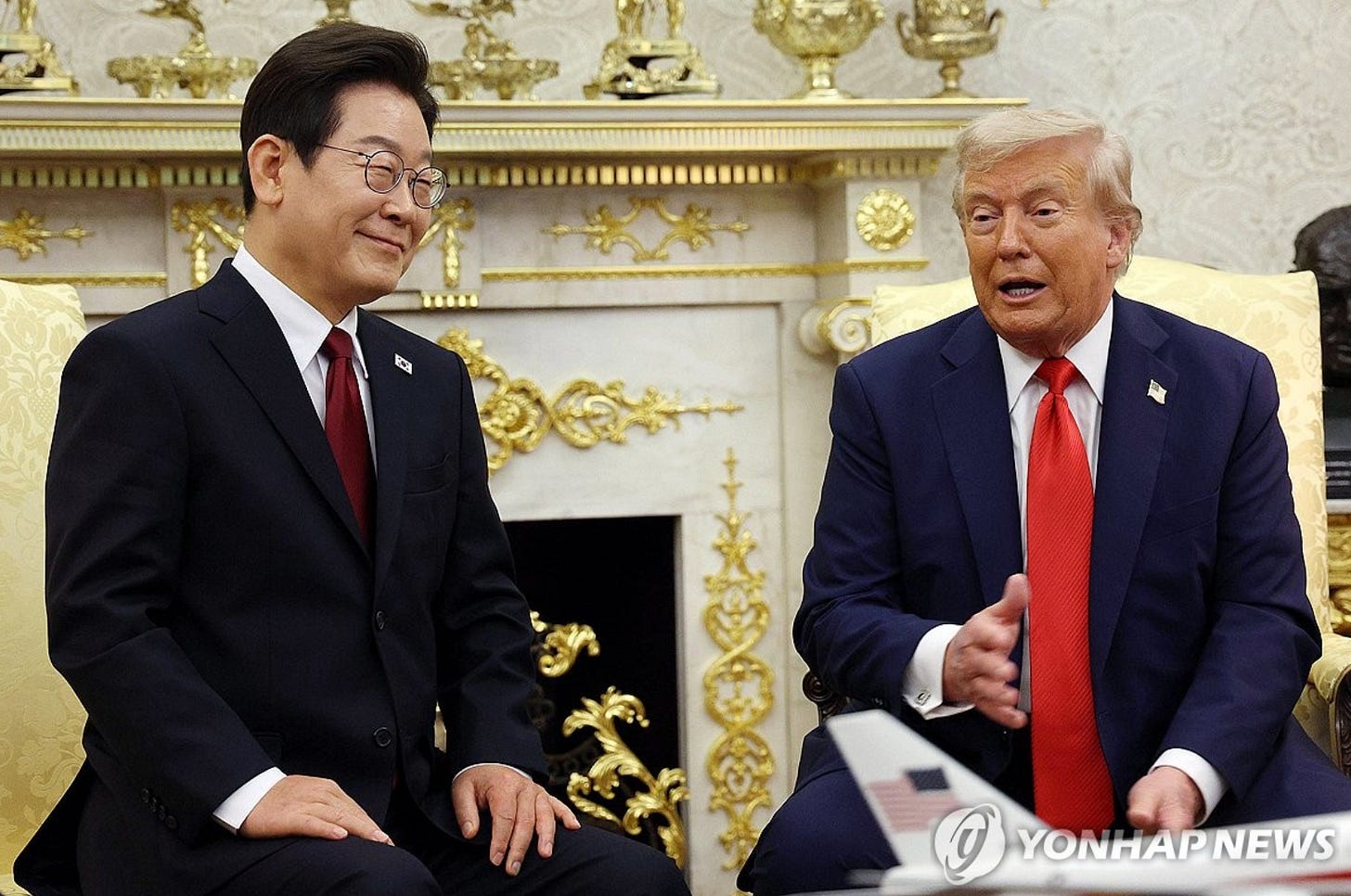
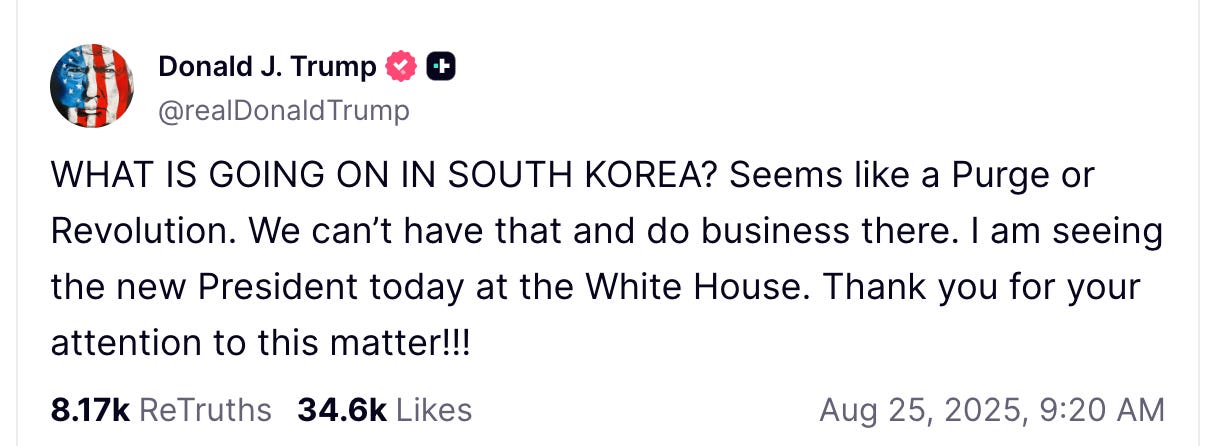
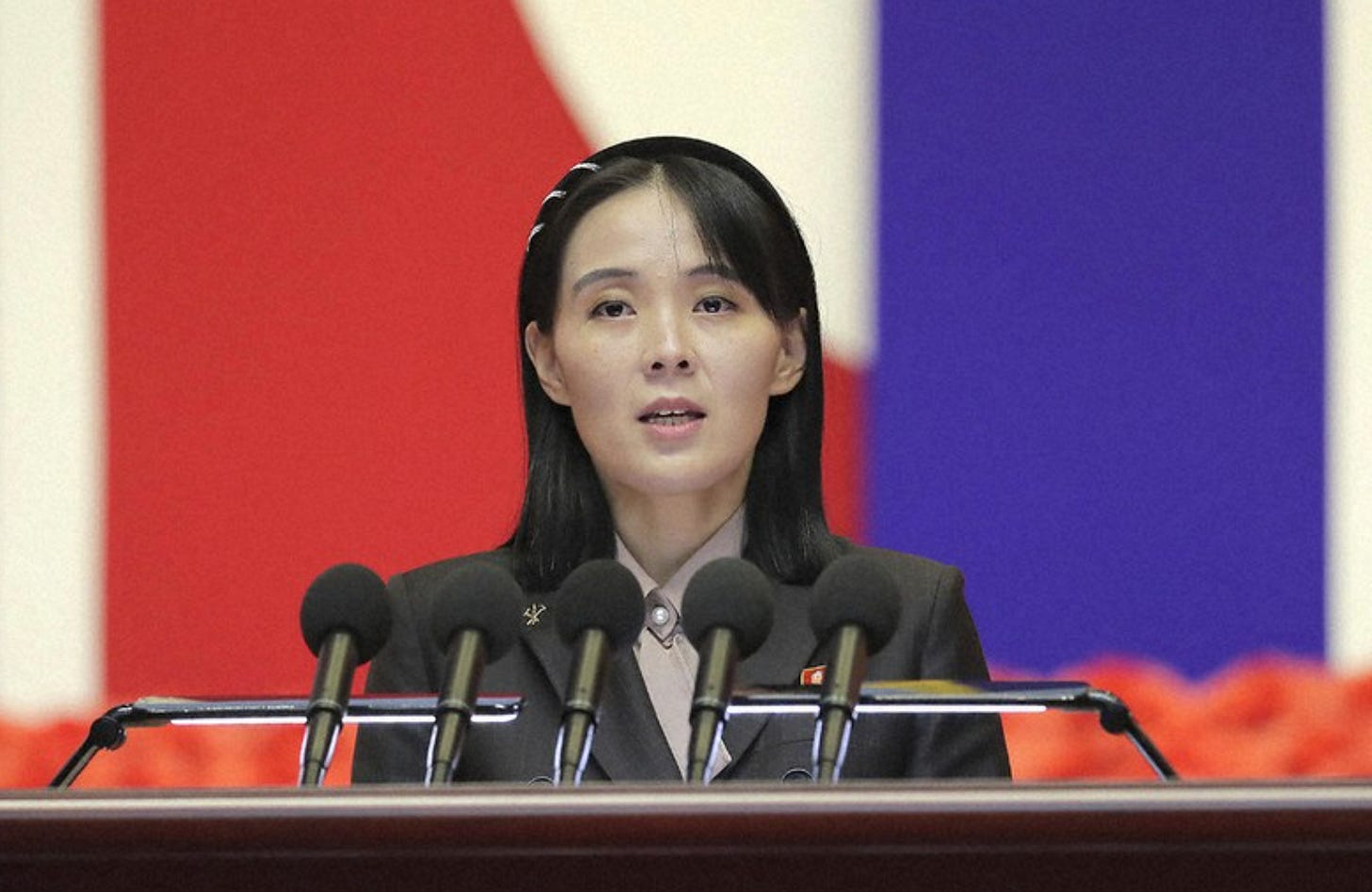
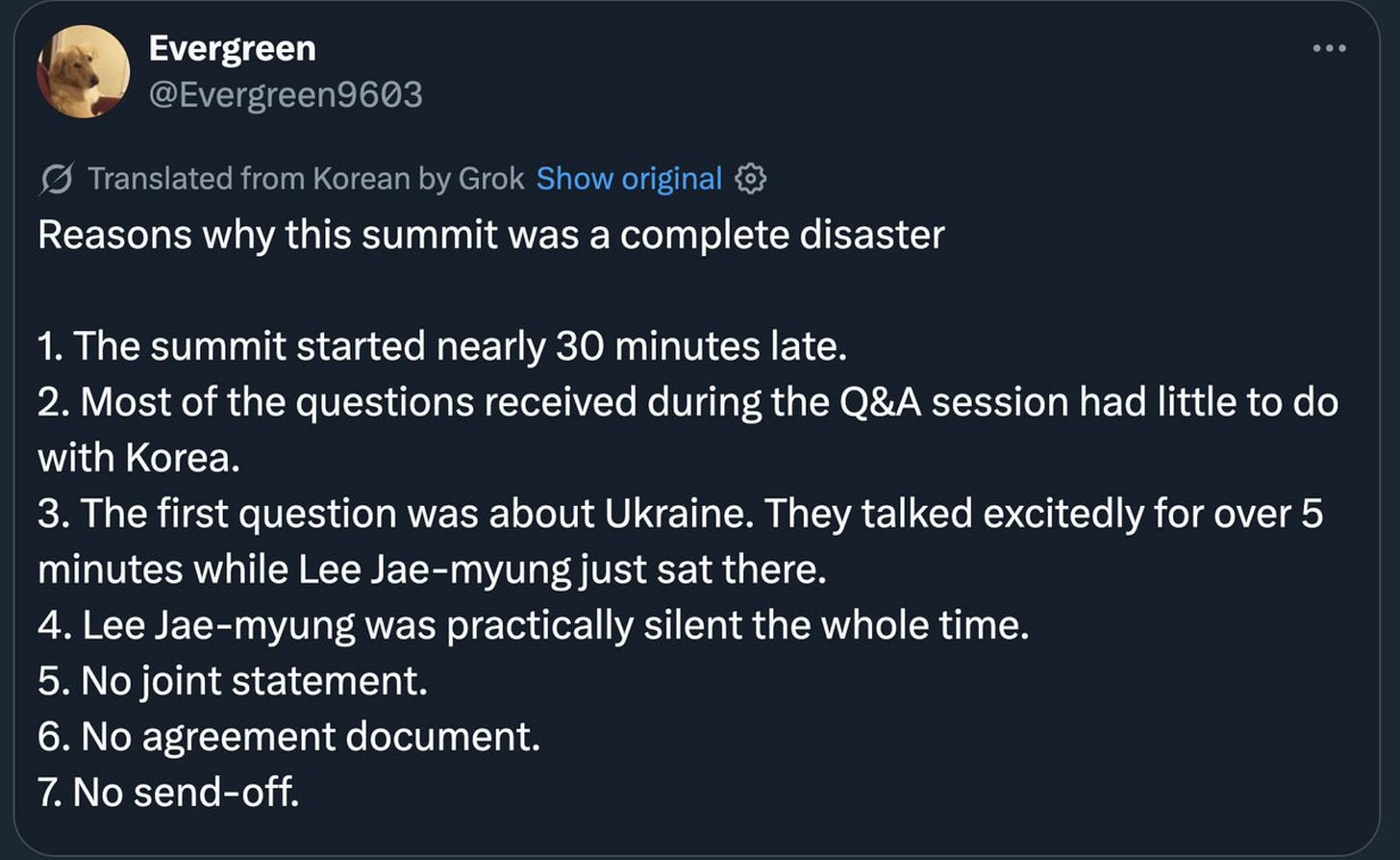
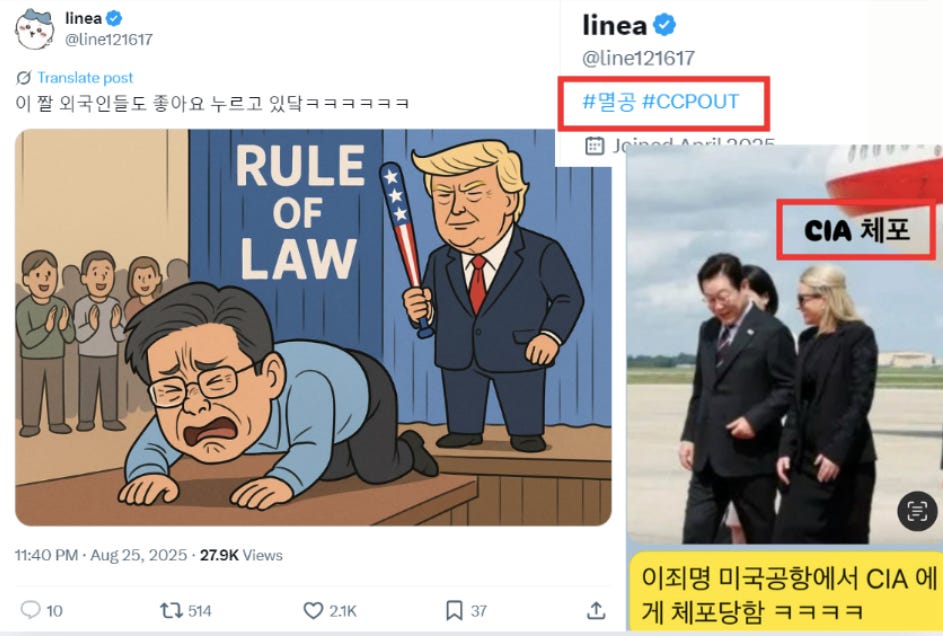
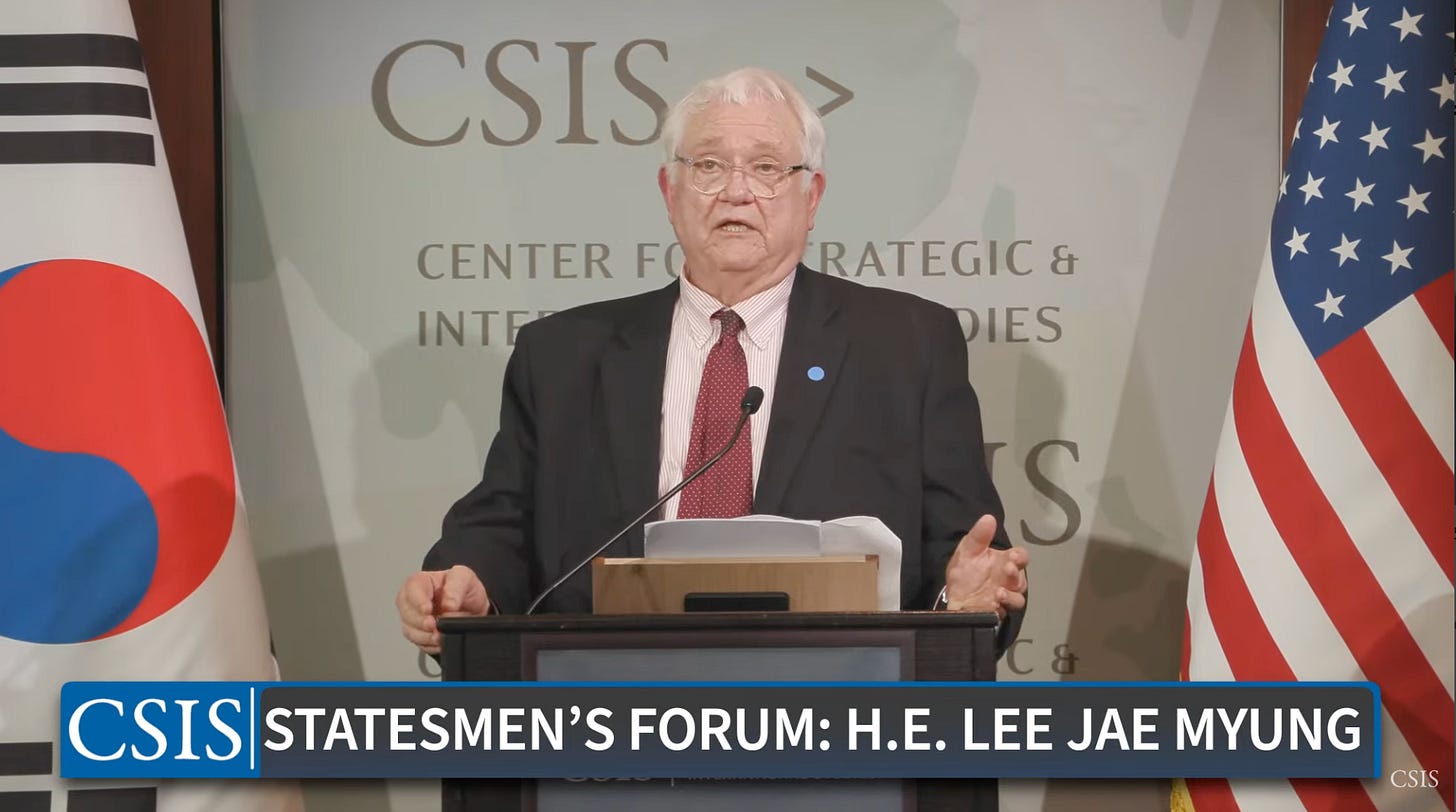
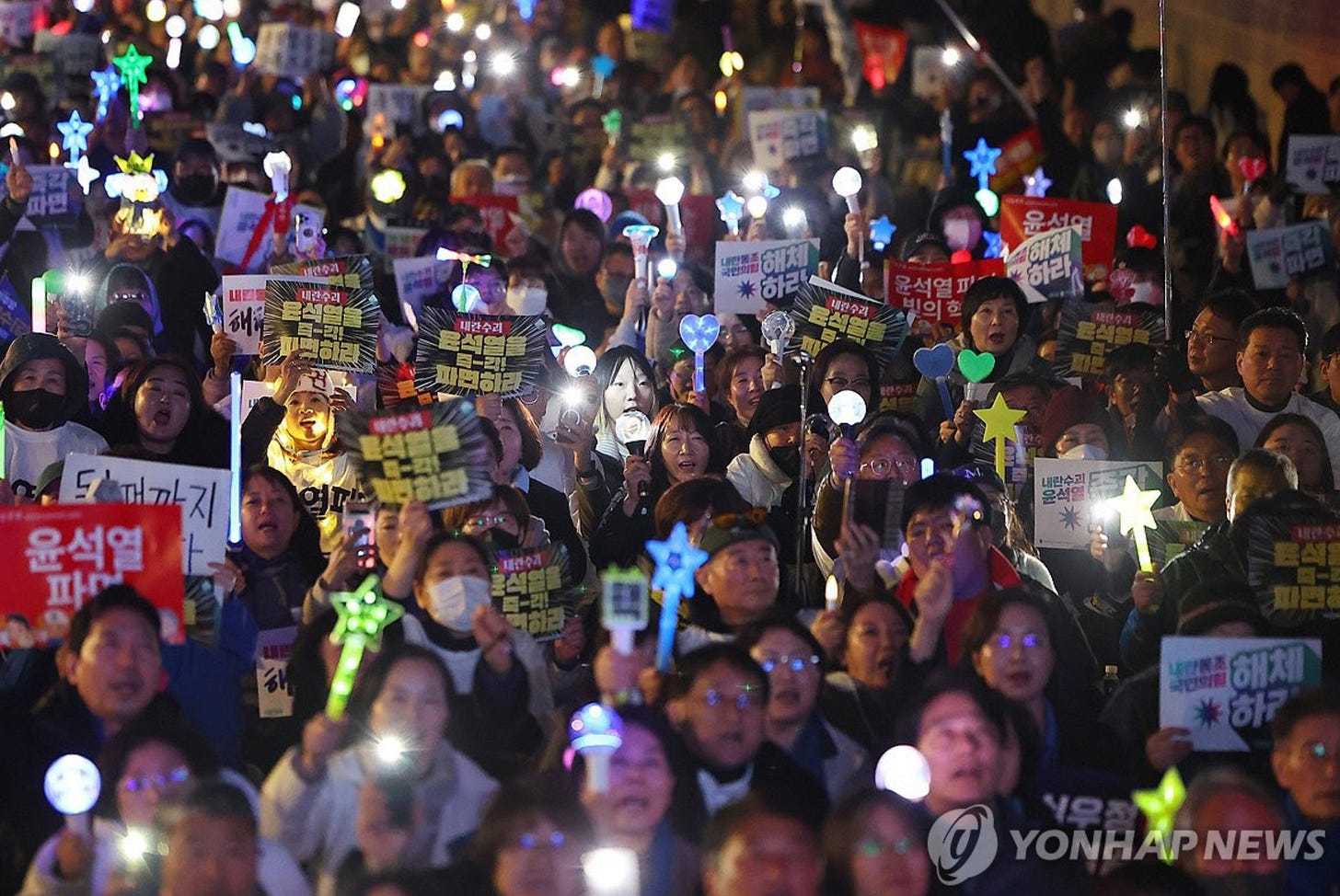
Interesting take! The author is clearly knowledgeable about Korean domestic politics.